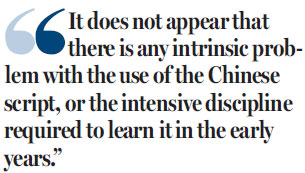Learning Chinese characters can offer educational benefits
Updated: 2016-06-24 06:52
(HK Edition)
|
|||||||
I was fascinated by a recent article (June 10) by Professor Jocelyn Chey, from the School of Languages and Cultures, University of Sydney, and previously a senior Australian diplomat and consul-general in Hong Kong and Macao. She was commenting on a debate between two non-Chinese academics on whether the use of Chinese script is a help or a hindrance for Chinese participation in global culture in the digital age. On the one hand, early suspicions that it might be difficult to integrate Chinese script in digital platforms have proved unfounded; on the other, it is undoubtedly true that Chinese characters remain extremely difficult to master, particularly for those not "born" to them, and thus, though digital exchanges present no problem to them, human exchanges will likely continue to do so. Moreover, it has not yet proven possible to exclude the necessity for the latter in world affairs.
Behind all this, as Chey pointed out, is another old chestnut of a debate, namely, is the Chinese cultural sphere itself held back by the burdensome need to master the discipline required to learn to use Chinese script at a high level? I am not, of course, Chinese, but am in a position to speak of the difficulties presented by acquiring literacy in Chinese, as I have spent 30 years trying to do it. Not only was it excruciatingly difficult, but also nothing in my previous academic life had prepared me for it. It is an oversimplification, and yet broadly true, that Western education has moved some distance away from ancient traditions of rote learning and has, for better or for worse, "modernized" itself, whereas Chinese education remains bound by the need for rote learning simply to enable the population to read and write. (Believe me, if there was ever a way to learn characters without grinding hard labour, I'd have found it.) As Chey pointed out, "Modern Western curricula downplay rote learning, and education gurus such as Ken Robinson emphasize the importance of building students' critical thinking faculties rather than imparting facts, so that they can cope with a rapidly changing world."

But it cannot be true that the education of Chinese young people has been badly held back by the need to devote most of the primary stage to basic literacy. In international comparisons Chinese students score pretty well, and in Western countries children of Chinese origin tend to perform spectacularly well; yes, Chinese families tend to impose stricter discipline, but that cannot be the whole story.
There are clearly advantages at some level to disciplined and tightly structured learning. Equally, the importance of building critical faculties cannot possibly be played down in a world where innovation is fundamental and jobs for the intellectually inflexible simply do not exist anymore.
Any reference to ethnic groups in the context of socio-economic differences is fraught with danger in modern discourse. But there may be a Western parallel relevant to this debate. For centuries the Jewish people, spreading from the Middle East across Europe and North Africa, maintained a tradition of highly literal education, based on systematic study of ancient texts, inevitably involving a highly disciplined approach in the first years of education, which later served as a foundation for a serious intellectual tradition which was generally respected - although it often led to a level of cultural and economic success which attracted envy and persecution. One does not wish to push the parallels too far, but comparisons offer themselves with the position of Chinese communities in Southeast Asia, which frequently became economic, business and cultural leaders in those regions, and have also found themselves envied and persecuted for that reason.
Thus it does not appear that there is any intrinsic problem with the use of the Chinese script, or the intensive discipline required to learn it in the early years. (In the early stages of learning Chinese I developed a healthy respect and admiration for the Chinese 6-year-old.) It can (and clearly does) provide a healthy platform on which an impressive intellectual edifice can be built. However, in the more advanced phases of education it is necessary to change the pattern and develop critical faculties further; from a certain point the capacity for innovation needs to be nurtured and students must be equipped to think for themselves rather than asking the teacher.
Hong Kong, with its bicultural heritage, is surely as well placed as anywhere to press forward in this dual approach; but never forget that Singapore's Lee Kuan Yew pioneered this approach and allowed his country to steal a march on Hong Kong to some extent. Singapore is of course an independent country whereas Hong Kong is not; but, as a separate economic entity, Hong Kong needs to ensure its capacity to compete fairly but effectively with all the cultures and economies of the region.
The author is a former UK diplomat specializing in China. He spent nine years as an analyst in Beijing. He now works as a freelance writer and commentator.
(HK Edition 06/24/2016 page7)